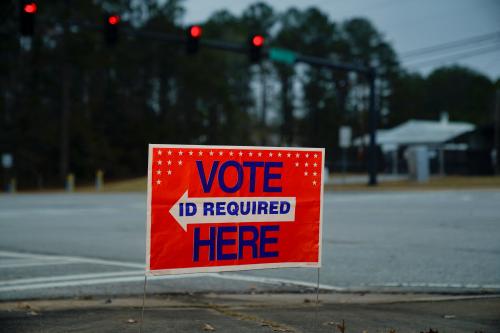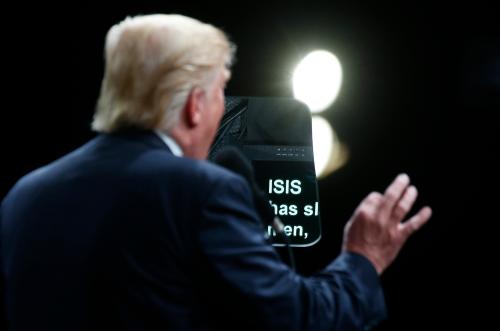Almost everyone now agrees there has been great progress in Iraq. The question is what to do about it.
Democrats led by Barack Obama want to take a peace dividend and withdraw all combat brigades by May 2010. Republicans like John McCain want to keep troops in Iraq until conditions on the ground signal the time is ripe. And now the Iraqi prime minister, Nuri al-Maliki, has endorsed a timetable for withdrawal, though he seems to favor a somewhat slower pace than the Democrats propose.
If the Iraqi government tells us to leave, we should go. But this would be a bad deal for both Iraqis and Americans. Iraq is indeed much more secure than it was two years ago, thus it seems safe to suggest timing goals for significant withdrawals. Yet having recently returned from a research trip to Iraq, we are convinced that a total withdrawal of combat troops any time soon would be unwise. (The American military arranged the logistics for our visit, and Foreign Affairs magazine will publish another article about our trip.)
Violence in Iraq declined because the key combatants were either defeated in the field or agreed to cease-fires. These cease-fires were not accidents or temporary breathing spells. They were a systematic response to a new strategic landscape created by 2006’s sectarian bloodletting, the American surge last summer, the defeat of Al Qaeda’s forces in Anbar Province and the decision by battered Sunni insurgents and Shiite militias that fighting no longer served their interests. The underlying strategic rationale behind these stand-downs gives reason to believe that they are sustainable rather than ephemeral.
But this does not make the peace inherently stable. Wary former combatants are constantly on the lookout for signs — real or imagined — that rivals mean to take advantage of them. The cease-fires, moreover, are extremely decentralized: more than 200 tribal and regional groups have reached individual agreements with the United States to stand down from fighting; in time, some will inevitably test the waters to see what they can get away with, or will misinterpret innocent behavior from neighbors as threatening and retaliate.
A leader of one group of Sunni tribesmen who had switched allegiances and took up arms against Al Qaeda made this point at a meeting we had at Salman Pak, a military base south of Baghdad. He told us he was worried about encroachment onto his territory “from several directions” — apparently meaning he didn’t trust his Sunni neighbors any more than he trusted his traditional Shiite rivals. Left on their own, minor local flashpoints could easily spiral into a renewal of widespread violence.
For now, the American combat presence plays a critical role in enforcing the terms of these cease-fire deals and damping escalatory incentives from spoiler violence. Iraqi government security forces, while they demonstrated improved effectiveness this spring in places like Basra and the Baghdad slum of Sadr City, cannot yet play this role themselves.
In part this is because they are still not trusted by all cease-fire participants. To many Sunnis in particular, a government military commanded by a Shiite regime is not yet trustworthy enough to be tolerated without an American presence to keep it honest. To some extent, this is changing: for example, the National Police have replaced three-fourths of its leaders over the last year or so and now have more than a proportionate share of Sunnis in command positions.
But full reconciliation will take time. On our recent trip, we heard several Sunni sheiks — one was a brother of Sheik Abdul Sattar Buzaigh al-Rishawi, the Americans’ staunchest ally in Anbar until he was assassinated last fall — talk about their newfound regard for Prime Minister Maliki. However, some also discussed their convictions that most other Shiite politicians were “bums” at best and agents for Iran at worst. American troops, by contrast, are generally trusted, if not necessarily loved.
Troop loyalty is not the only concern. The Iraqi security forces are simply not yet able to operate effectively without United States air support, combat advisers and help with logistics and intelligence. When Iraqi units with no American embeds tried to take the port city of Basra last spring, they were turned back in mass confusion, and it required United States combat help to save the day.
American combat troops are also critical for political progress in Iraq. There has been real political change in Iraq — but less from the grand bargains imagined by many Americans and more through thousands of informal, local decisions by war-weary groups and individuals opting to put the past behind them. The pressure from this “bottom up” process has also translated into top-down progress. Over the past year the Iraqis have passed critical amnesty, de-Baathification and provincial-powers laws, as well as a federal budget — all of which had been previously seen as hopelessly deadlocked.
But to capitalize on this progress the next two rounds of elections — provincial races this fall and a national contest next year — must go smoothly and be seen as legitimate. The elections will create losers as well as winners, breeding a grave risk of instability in an immature polity. American combat troops are needed to protect polling places from terrorism, and even more important, from voter intimidation, fraud and the perception that the results were rigged.
Over time, the need for United States contributions will diminish. The longer violence stays down, the more Iraqis’ expectations of one another will improve. Groups of former insurgents being gradually integrated into the Iraqi security forces should become more trusting of the government. And as their technical proficiency and self-sufficiency increase, the need for partnership with American combat units will decrease.
Ideally, progress will also be made on such key issues as the resettlement of four million people now displaced by violence, the equitable sharing of Iraq’s future oil revenues, and a resolution of disputed internal borders in places like the oil-rich city of Kirkuk. But this won’t happen overnight: a stable post-election environment cannot possibly be established until after next year’s elections. If current trends continue, major reductions in American troop levels will be possible — but to begin large-scale drawdowns, much less to complete them, before mid-2010 is to run serious risks.
What can be done, then? One possible model is provided by Anbar Province, which has gone from being Iraq’s most violent region in 2006 to arguably its best today. In 2007, the United States had 15 maneuver battalions in Anbar. Today it has six — far fewer, but nothing close to zero. Several hundred marines remain as advisers with Anbar’s two Iraqi Army divisions; Americans still do some joint patrols with Iraqi forces (if fewer than before), and many Americans work with provincial police and border-security forces. Anbar offers a model for large — though gradual and partial — withdrawals across Iraq that can preserve stability in the process.
American experiences in Bosnia and Kosovo are also instructive. A key to stability in the Balkans has been the presence of outside peacekeepers to enforce the deals that ended the fighting. Yet the number of peacekeeping troops had fallen by about 50 percent four years after the cease-fires were reached in both cases. The Balkan peacekeeping job was easier in some important ways, as it was built on a formal peace treaty among just a few major parties, whereas Iraq’s newfound partial stability is built on scores of local cease-fires signed in 2006 and ’07. It seems clear that withdrawing troops faster from Iraq than we did from Bosnia and Kosovo could be very risky.
Still, the Balkan experience suggests a serious prospect for major withdrawals — perhaps on the order of half the American troop presence — in the next two to three years. Thereafter, if current trends continue, reductions might proceed roughly on the Balkan schedule — with barely 10 percent of the original force expected to be remaining a decade after the end of major hostilities.
Why, then, does Prime Minister Maliki want an earlier withdrawal of United States combat forces? Part of the answer may lie in simple overconfidence: as Americans may recall from the spring of 2003, victory can easily be declared too soon. Another factor, however, surely lies in Iraqi domestic politics. With elections looming, Mr. Maliki and other members of the current government hope to demonstrate that they brought about the end of the occupation and the return to normality during their term.
Mr. Maliki in particular has sought to position himself as the symbol of Iraqi sovereignty, and surely hopes to supplant his young rival Moktada al-Sadr, the standard-bearer for Iraqi nationalism. What better way to do this than to champion a timetable for an American withdrawal, especially when the security forces that would replace the Americans are under his command and his Shiite faction enjoys the preponderance of power in Iraq?
It would be tragic, however, to allow American haste and Iraqi political opportunism to undermine a real chance for long-term stability in Iraq. Perhaps an early withdrawal would succeed, and today’s system of cease-fires would survive a rapid United States drawdown. But much important work remains to be done in Iraq. And to believe that it can be done without the longer presence of a significant number of American combat troops requires a degree of optimism that could well end up making “Mission Accomplished” look as premature today as it was in 2003.



Commentary
Op-edU.S. Troops Not Quite Ready to Go Home from Iraq
August 5, 2008